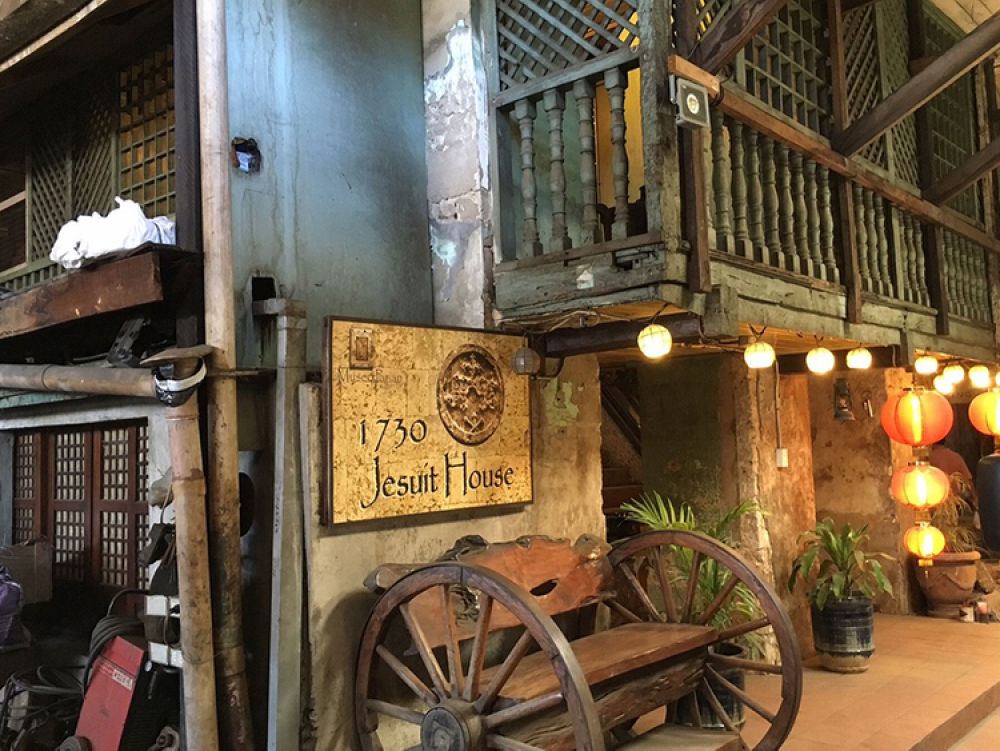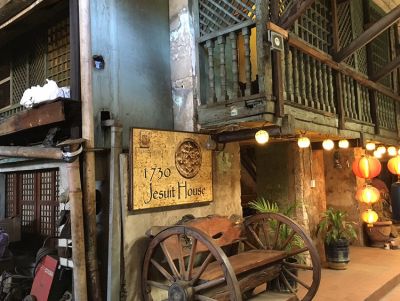

Take a fascinating step back in time with the Historical Tour of the 1730 Jesuit House, a hidden gem nestled within the bustling streets of Parian, Cebu City. This tour allows you to explore one of the oldest residential houses in the Philippines, showcasing a unique blend of Spanish colonial architecture and Filipino heritage. As you walk through the ancient corridors, you'll be surrounded by antique furnishings, religious artifacts, and centuries-old paintings that tell the story of Cebu's rich history. Knowledgeable guides provide in-depth insights into the Jesuit missionaries' influence on Filipino culture and the house's transformation over the years. The tour also includes a visit to the Museo Parian sa Sugbo, which exhibits various Cebuano cultural treasures, providing visitors a deeper understanding of the island's vibrant past.
Capture the essence of 18th-century Cebu with a Photography Session at the historical 1730 Jesuit House. This activity is perfect for amateur and professional photographers alike who are looking to add a touch of history and architectural beauty to their portfolios. The well-preserved grounds and interiors of the Jesuit House offer a myriad of captivating backdrops, from rustic wooden staircases to stonewalls enveloped in creeping vines. Photographers can delight in the challenge of capturing the interplay of light and shadows in the house's many rooms and hallways, each telling a tale of their own. Additionally, the session gives a unique opportunity to photograph the details of the period furniture, artifacts, and art pieces that adorn this historical residence, creating a series of evocative and timeless images.
Immerse yourself in the rich Cebuano culture with a series of Cultural Workshops offered at the 1730 Jesuit House. Participants can choose from a variety of hands-on activities such as traditional weaving, old-fashioned Filipino calligraphy known as 'baybayin', and Cebuano cuisine cooking classes. Each workshop is designed to provide an authentic learning experience, teaching the skills and techniques that have been passed down through generations. The workshops are not only educational but also a testament to the Jesuit House's commitment to preserving Cebu's tangible and intangible cultural heritage. Whether you're a history buff, a cultural enthusiast, or simply someone looking to try something new, these workshops provide a valuable and enjoyable way to connect with the past while having fun.
Expand your knowledge about Philippine history and heritage with enlightening Talks and Seminars hosted at the 1730 Jesuit House. These events feature a range of topics including the history of the Jesuit missionaries in Cebu, the evolution of Filipino architecture, and the conservation efforts for historical sites. Expert speakers, including historians, cultural advocates, and academicians, lead the sessions, offering attendees in-depth analyses and engaging discussions. Participants can engage in Q&A sessions and interactive discussions that enhance their understanding of Cebu's place in the wider context of the country's history. Attending these talks and seminars at the historic venue adds a layer of authenticity and inspiration, making for a compelling educational experience.
Experience the captivating allure of Cebuano traditions with live Traditional Music and Dance Performances at the 1730 Jesuit House. Local artists in vibrant costumes bring the courtyard to life, performing traditional dances such as the 'Sinulog' and 'Balitaw', which are significant to the Cebuano cultural identity. Accompanied by the melodic sounds of native instruments like the 'banduria', 'octavina', and 'guitar', these performances offer a glimpse into the island's festive spirit and musical heritage. Visitors are invited to not only watch but also learn a few dance steps or try out the instruments, creating an interactive experience. These performances are usually scheduled during special events or upon request for group tours, adding a festive dimension to the historic ambiance of the Jesist House.
Appreciate the convergence of history and art with periodic Art Exhibitions held at the 1730 Jesuit House. The exhibitions feature works from both local and international artists, showcasing a spectrum of art forms including paintings, sculptures, and mixed media installations. These themed exhibitions aim to provide a contemporary perspective on historical subjects, inviting visitors to reflect on the past's influence on modern art and culture. The majestic setting of the Jesuit House adds a dramatic backdrop to the artworks, allowing for a truly immersive experience. Art aficionados and casual visitors alike can enjoy exploring the exhibits, engaging with the narratives depicted by the artists, and gaining insight into the growing art scene in Cebu.
Indulge your taste buds in a Colonial Culinary Experience that takes you back to the flavors of Old Cebu at the 1730 Jesuit House. This unique dining event serves up traditional Cebuano dishes that have been prepared using centuries-old cooking methods and recipes. Imagine feasting on a spread of historical delicacies in the grand setting of an ancestral hall, complete with period-appropriate table settings and ambient lighting that enhances the authenticity of the experience. From savory soups to rich desserts, each course is an exploration of the culinary influences brought by the Spaniards and how these melded with local ingredients and cooking styles. The Colonial Culinary Experience is not merely a meal but a palatable journey through the history of Cebu's gastronomic evolution.
Brace yourself for an eerie adventure with the Nightly Haunted Tours offered at the 1730 Jesuit House. As the sun sets, the ancient walls of the house seem to whisper secrets of the past, making it the perfect time for a ghostly exploration. Led by storytellers who are experts at setting the mood, guests are guided through dimly-lit corridors and creaky rooms while listening to spine-chilling tales of encounters and apparitions that are said to inhabit the space. This tour provides a thrilling perspective on the heritage site, combining historical facts with folklore and the supernatural. It's not just a test of courage but an unusual way to experience and appreciate the layers of history that blanket the Jesuit House after dark.
Delve into the deep religious history of Cebu with the Religious Artifacts Exhibition at the 1730 Jesuit House. This exhibit offers guests the opportunity to view a remarkable collection of ecclesiastical artworks, vestments, and liturgical items that date back to the Spanish colonial period. Each piece tells its own narrative of devotion and artisanship, from elaborately embroidered altar cloths to intricately carved santos (holy statues). The exhibition serves as a testament to the Jesuit influence on Cebu's religious life and provides insight into the ways faith played a central role in community and daily life. Guests can admire the craftsmanship and commitment to religious expression that these artifacts represent, giving them a deeper understanding of the Philippines' Catholic heritage.
Round off your visit to the 1730 Jesuit House with some Souvenir Shopping at the on-site gift shop. This charming store offers a variety of memorabilia that encapsulate the spirit of your historical journey. Browse through a selection of handcrafted items ranging from traditional Filipino textiles to locally-made jewelry, woodcrafts, and art prints. Each item is carefully curated to represent Cebu's rich cultural tapestry, providing visitors with authentic keepsakes and gifts. Supporting these local artisans not only allows you to take a piece of Cebuano history home but also contributes to the preservation of traditional crafts and the livelihood of the community. Souvenir shopping here is more than just a transaction; it's an appreciation of culture and a means to remember your journey through the past at one of Cebu's oldest landmarks.
